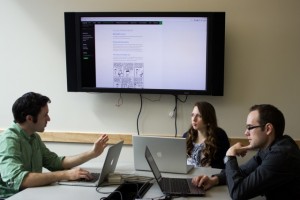
Three BYU information systems students have joined together to start a website that could change the way teens interact online by establishing lifelong safety habits.
Devin Cope, Sean Southerland and Julie Walton are students in the Master of Information Systems Management program at BYU. As part of a capstone project for graduation, these three students are in the process of creating CyberIQ, a website to inform teens of ways to ensure safe online behavior.
“We’re creating content to be able to train and help educate teens how to protect themselves online and with technology, including mobile phones,” Cope said. “We’re creating it in a way so it’s geared towards teens, but it’s also going towards parents and educators so that if they can understand what their teens are faced with and how to prevent it they can help educate their teens and make sure that they are doing correct things to help protect themselves.”
The idea came in September 2013 when Cope proposed the idea to professors and the two other student creators. Since the beginning of fall semester, these three have worked to narrow down their target audience, finish planning and begin working on the website.

“Devin proposed the idea to us in September,” Walton said. “The last semester of the graduate program, you complete a capstone project where each person is required to put 150 hours into some project. He proposed the idea to Sean and I to have the three of us work on this project together to educate teens on cyber security.”
The CyberIQ creators plan to hold a webcast training session in April where local school districts would learn how to present the website to the teens. Four local school districts have already partnered with the project and will continue to work with Cope, Southerland and Walton to implement the safety tools in their schools.
“Currently, our scope is through the end of the semester and so we would like to have our website up with most of the materials and tutorials, but the long-term scope is that we would love to get it to where it’s a continuing and live website,” Southerland said.
As part of the Marriott School of Management’s goal to complete 25,000 hours of service before the end of the school year, CyberIQ held an event for 30–40 students to create content for the website. In addition to the student volunteers, social venture groups, various professors and a retired FBI agent have contributed to this project.
“We’ve been reaching out in all sorts of directions,” Walton said. “We’re trying to have students help us build the content for the site.”
Iteration of the long-term project is expected to be completed this April. The CyberIQ creators will continue to work on the website after they graduate and have created a wiki site to allow content contributions from other interested students or professors along the way.
“This is important; make sure that you’re practicing safe online behavior,” Southerland said. “I think a lot more people can get involved than actually do. Because our generation is right in the middle of this, we already have a higher ‘cyber IQ,’ so it’s possible for people to contribute who aren’t information systems students.”
These three students are excited about the future of CyberIQ and are eager to share their work and excitement with their fellow BYU students. This program is not only important for teens online, but it also affects students all over.
“I think even for college students this is a major concern,” Cope said. “This is great for them to learn. If they don’t already have kids, they will have kids eventually, and if they aren’t practicing secure cyber behaviors, then they’re vulnerable themselves, and if they aren’t doing it, their kids especially aren’t going to do it.”
CyberIQ encourages students to visit the site and sign up for updates to follow along as the team works to complete the website. Visit www.cyberIQ.org to learn more information or follow the project Facebook, Twitter, or Google+ accounts to stay updated.




